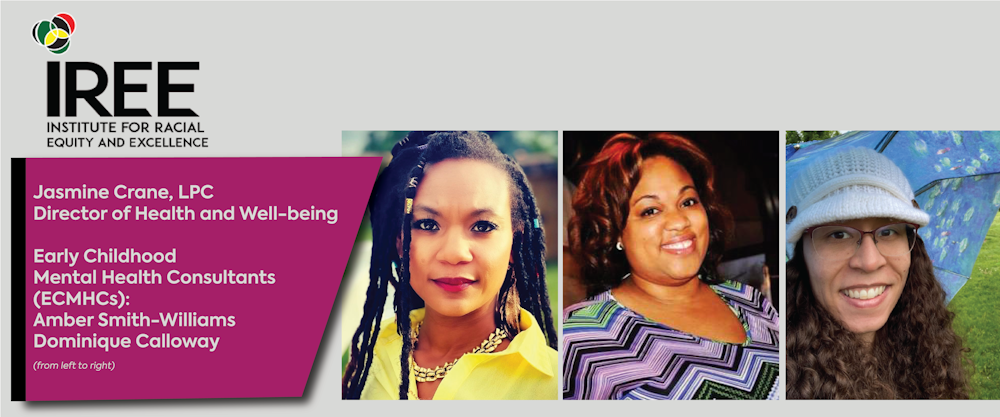
CONNECTING WITH THE ADULTS WHO ARE CHANGING THE LIVES OF KIDS.
Jasmine Crane, LPC
Director of Health and Well-being
The Institute for Racial Equity and Excellence (IREE)
Early Childhood Mental Health Consultants (ECMHCs):
Amber Smith-Williams
Dominique Calloway
The mission of The Institute for Racial Equity and Excellence (IREE) is to create inclusive environments and to ensure equity and social justice at all levels of society. They work to change perceptions and practices in the workforce to enhance child, family, and community outcomes, especially partnering with those who work with communities of color and other marginalized groups.
Jasmine Crane, a Licensed Professional Counselor (LPC) is the Director of Health and Well-being at IREE where one of her responsibilities is to supervise IREE’s Early Childhood Mental Health Consultants (ECMHCs)—Amber Smith-Williams and Dominique Calloway. Together, under the leadership and direction of Jasmine, they are all responsible for providing training and education for adults working in the care and support of young children. This includes but is not limited to teachers, providers of childcare, or others who work with children to help kids live their most successful lives. IREE’s ECMHCs focus is on social-emotional learning through a lens centered on equity, diversity, and inclusion. “A lot of our work is with people or organizations who want to improve how they can better include an EDI lens to their work, such as a school or daycare that wants to move more in that direction but aren't sure what steps to take to be able to do that,” Amber explained.
While they focus their direct service hours in Arapahoe County, IREE’s ECMHCs serve the entire state, either in person or via virtual programs, offering a variety of services including school staff training, speaking and training at conferences, and also providing special programs like Seedlings. Seedlings offers 10-week courses (in-person and virtual) that “Nurture the seeds of hope, strength, knowledge and love.” The courses include topics like helping parents learn stress management techniques and buffer toxic stress so they can better care for their families and give their kids brighter futures.
“Part of the work we do involves teaching adults about generational trauma so they can be aware of it when they work with kids,” Amber explained. “We understand that habits and behaviors in past generations can be passed down to current generations and then become unhealthy patterns of behavior and response. Spanking is a good example of something that was actually encouraged a couple of generations ago. We work to help anyone working with children to not only recognize those patterns of behavior, but find new ways to address issues with positive, non-physical solutions and give adults a more effective bucket of parenting or teaching skills.”
Dominque added, “We meet some teachers who've been in the field for 20+ years, and we love that longevity. But sometimes doing the same thing for so long gets them stuck. We try to take their strengths and help them begin to rework some of their tactics so that they're more effective in the classroom.”
IREE, as a whole, is also committed to helping teachers, caregivers and others who work with children recognize cultural differences. They are known for their community-based, culturally responsive approach to childcare licensing, social and linguistic justice, in addition to their work in early childhood mental health. Every case with whom they work begins by looking at the people involved through a culturally responsive lens. “Culture is more than race and ethnicity,” said Dominque. “We help them look at all things that make up culture, so that they see the children they work with as a compilation of many things and recognize how a family’s culture affects their view of the world. That helps individual kids be better understood in the classroom.”
Dominque said they were recently in a situation where they received feedback that the previous mental health staff with whom they worked didn’t understand the culture of the school or the cultural background of teachers – most of whom were not born in the U.S. “A lot of their family is still in Ukraine,” Dominique explained. “And the current conflict there is creating a new form of generational trauma that is going to be passed down to kids. We work to help teachers recognize kids dealing with trauma and learn to know how to work with them.”
Additionally, the pandemic was a trauma that everyone went through, but teachers and caregivers had an especially stressful time and IREE’s ECHMCs say they are seeing a lot of residual burnout now with teachers and providers.
Jasmine, Amber, and Dominque bring their own experiences and life journeys to their jobs, helping them have empathy and compassion for the kids and adults they work with. They often work with students of color, families who have been involved with CPS, lower-income families and those dealing with substance use. Dominque said, “I know what it feels like to be a Black woman going through the Colorado school system, from preschool all the way to graduate school. I bring that to the table and know what it feels like to be a six-year-old sitting at that table in a school and not understanding what is going on, or having a teacher who doesn’t realize I needed them to teach a little bit different to be effective for me.”
Through money received through Early Milestone Colorado’s CIRCLE grant, Jasmine provides free mental health services to Colorado providers of childcare. If you would like any more information on the services offered by IREE, please reach out to Jasmine at jasmine@IREEinc.com.
For Providers:
IREE offers classes for parents on how to interrupt the intergenerational transmission of toxic stress. It is a 10-week course on teaching new and expecting parents skills to buffer toxic stress from impacting their child's futures. Offered both in person and virtually, please share this important resource with your moms and your community. Download the flyers here.
Share this article:





